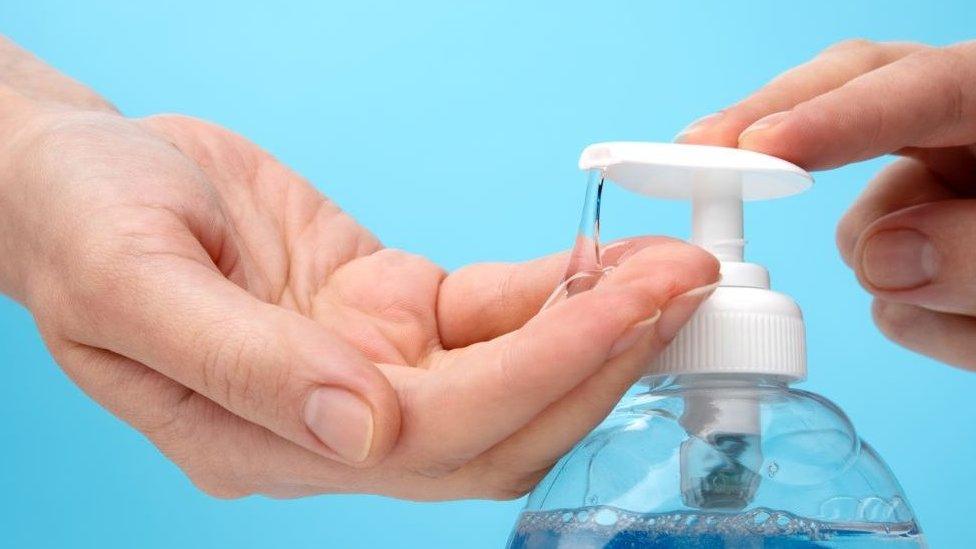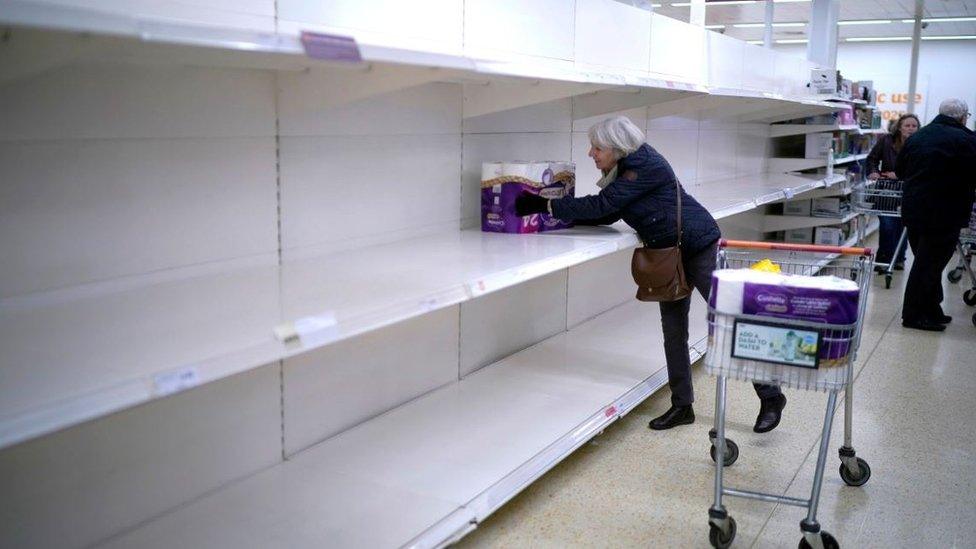Coronavirus: Warning to traders overcharging during pandemic
- Published
- comments

Trading Standards says it has received a high volume of reports of price gouging
Trading Standards has issued a number of enforcement notices to traders engaged in profiteering during the coronavirus outbreak.
The body says it has received a high volume of reports of price gouging - when traders increase the price of goods or services unreasonably.
People have reported small bottles of hand sanitiser being sold for £13 and eight kitchen rolls for £15 in NI.
Other complaints include liquid paracetamol rising from £3.69 to £7.49.
Some customers have raised concerns about meat packs doubling in price and individual toilet rolls being sold from a multi-pack.
There is no specific law which tackles the issue - businesses are free to set their own prices - but the Competition and Markets Authority is working to ensure consumers are not being exploited.

A SIMPLE GUIDE: How do I protect myself?
AVOIDING CONTACT: The rules on self-isolation and exercise
LOOK-UP TOOL: Check cases in your area
MAPS AND CHARTS: Visual guide to the outbreak

Damien Doherty, chief inspector of the Trading Standards Service, said while the vast majority of NI businesses had responded responsibly, a minority had engaged in profiteering.
"Those inflating prices to profit off the backs of their communities are adding to their distress and may be severely damaging their reputation," he said.
"Consumers in Northern Ireland are likely to remember those businesses who attempted to profiteer and may well vote with their wallets once this crisis ends."
Speaking on Good Morning Ulster Mr Doherty said there was "no actual maximum price that you can set for goods or services".

Remember these scenes early on in the coronavirus outbreak?
Trading Standards is working alongside the Consumer Council, which called on retailers to ensure they are giving consumers a fair price.
The Competition and Markets Authority has launched a taskforce to crack down on businesses that may be engaging in price gouging and to consider whether there have been any breaches of competition or consumer laws.
The authority is also asking consumers to report businesses which are behaving unfairly, external.
Mr Doherty said there are other consumer protection laws under which Trading Standards "can look at the general duty to trade fairly and to operate along the terms of honest market practice".
He added that both Trading Standards and the Competition and Markets Authority (CMA) have "come to the conclusion that some of our consumer protection laws have been infringed" during the pandemic.
Mr Doherty said the CMA has received more than 21,000 complaints over the past five weeks and has issued 250 enforcement notices.
He added that if the CMA feels that this problem "is getting out of control" then it can advise the government on the need for emergency legislation to introduce maximum price caps for goods and services, which has been done in the past.
Taking action
Mr Doherty confirmed that Trading Standards has already written to a number of Northern Ireland traders to ask them about recent price hikes.
He said that some businesses provided "reasonable explanations" for the rises, such as confirming that they had faced increased costs further up the supply chain because of Covid-19 and had passed that on to their customers.
But other traders who have been contacted "can't explain why they have increased their prices", according to Mr Doherty.
"So ourselves and the CMS certainly will be in discussions as to how we take forward any action against those traders profiteering or engaging in price gouging," he said.
- Published21 April 2020
